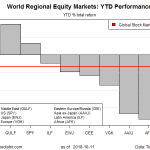OPEC’s move to limit Nigerian oil production combined with Saudi Arabia’s promise to limit exports in August sent oil prices higher on Tuesday morning. Nigeria had previously been exempt from OPEC’s production cuts that are currently in place until March 2018 due because it had been assumed that conflict in the region would limit output naturally, but a recent increase in Nigerian production threatened the success of OPEC’s production cuts. On Monday OPEC agreed that Nigeria would join its partners by capping its production or even reducing output from its current levels near 1.8 million barrels per day. Saudi Arabia’s Energy Minister, Khalid al-Falih, added that his country would cap crude oil exports at 6.6 million barrels per day in August, nearly 1 million barrels per day below levels a year ago.U.S. commercial crude oil inventory data will be released by the American Petroleum Institute later on Tuesday, and it is expected that the country’s inventories fell by 3 million barrels last week.
U.S. WTI crude futures were up 0.67 percent as of 10:36 a.m. HK/SIN, trading at $46.65 per barrel. Brent crude futures were up 0.62 percent to $48.90 per barrel after closing 1.1 percent higher on Monday.
Tuesday Morning Market Movements
The dollar rebounded slightly from six-week lows hit on Monday after stronger-than-expected readings from the U.S. factory and services sectors but it struggled to make real progress in the push higher. The euro was trading at $1.1652, up 0.12 percent and the dollar was trading at 111.04 yen, up slightly from Monday’s Asian session. The dollar index was at 94.078 DXY on Tuesday morning, up 0.1 percent after hitting 13-month lows on Monday. The dollar’s modest recovery sent gold prices marginally lower, with the precious metal trading at $1,253 per ounce, a 0.1 percent loss to start the day.















Leave A Comment